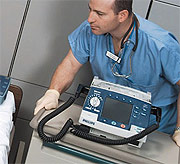Pediatric Dialysis
INDIETROPediatric Dialysis

The type of dysfunction affecting these patients involves the kidneys, which are the organs serving to cleanse the body.
In fact, it is estimated that about 1,500 liters of blood circulate through these organs every day.
In order to produce urine, the kidneys filter about a liter and a half of water out of 1,500 liters of blood, which is used to dissolve the waste to be eliminated. Urine is the means through which the body gets rid of poisons and acids.
When a disease begins to destroy the kidneys, the body slowly accumulates various substances that are damaging to the system itself. The most dangerous among these is potassium, because when it reaches certain levels it can trigger arrhythmias and cardiac arrest.
The Dialysis Center at Bambino Gesù Hospital performs hemodialysis treatments for acute and chronic cases and follows children treated through peritoneal dialysis.
The
Dialysis Center is able provide urgent and highly specialized
dialysis treatment and forms of continuous renal replacement therapy
(CRRT), which are applied 24 hours a day. These methods are also used
for children with serious cardiovascular issues, such as children who
undergo major cardiac surgery, septic patients, and those affected by
neonatal hyperammonemia.
Every
year, about 2,000 dialysis sessions are performed on chronic patients and treatment is provided for 10-15
children receiving peritoneal dialysis,
most of whom come in from other regions.
Why are defibrillators so important?
Patients affected by kidney disorders are susceptible to hypertension, which further increases the risk of cardiac arrest. In addition, dialysis in and of itself may cause a lower cardiovascular tolerance and expose the child to the risk of serious cardiac disorders. Sudden cardiac arrest is one of the leading causes of death if not treated within the first few minutes, and having a defibrillator on hand is what may make all the difference in the world.
A defibrillator is a device that makes it possible to treat the most frequent cause of cardiac arrest - ventricular fibrillation - by delivering an electric shock to the heart when necessary.
Defibrillation carried out within the first few minutes of cardiac arrest saves a life nine times out of ten. This device is absolutely fundamental and the Dialysis Center simply cannot go without it.
How has the Foundation contributed?
 The
Ginevra Caltagirone Foundation is pleased to have been able to
contribute to this cause by purchasing a life-saving piece of
equipment - the Philips M4735A HEARTSTREAM XL - to donate to the
Bambino Gesù Children's Hospital in Rome. This particular model
was chosen based on a careful study conducted by the Biomedical
Engineering Service as being the most suitable to meet the hospital's
needs, in compliance with European Council Directive
93/42/EEC concerning medical
devices (which includes general design and manufacturing criteria
applied to certain categories of medical devices).
The
Ginevra Caltagirone Foundation is pleased to have been able to
contribute to this cause by purchasing a life-saving piece of
equipment - the Philips M4735A HEARTSTREAM XL - to donate to the
Bambino Gesù Children's Hospital in Rome. This particular model
was chosen based on a careful study conducted by the Biomedical
Engineering Service as being the most suitable to meet the hospital's
needs, in compliance with European Council Directive
93/42/EEC concerning medical
devices (which includes general design and manufacturing criteria
applied to certain categories of medical devices).

